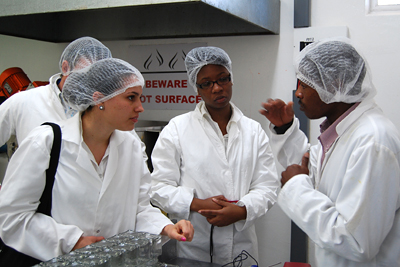Students help fledgling businesses in the developing world
By Jordan Walters

Over winter break, a select group of Cornell students teamed up with faculty and staff members to apply knowledge they've gleaned at Cornell to practical problems in South Africa, Kenya and Nepal, serving as consultants for small businesses and communities in the developing world.
As part of the Student Multidisciplinary Applied Research Team (SMART) Program, sponsored by the Cornell International Institute for Food, Agriculture and Development (CIIFAD), 22 students representing nine departments and majors spent up to three weeks in the various countries, providing technical assistance and analytical support to underserved companies and rural communities, while reaping hands-on experiences.
The experience allowed them to "put theory into practice and step into the real world," said applied economics and management major Seth Mosner '10. Business education, he added, "can feel impersonal and inhuman," but the SMART Program introduced an element of humanity to a discipline that is usually focused on profits.
In Piketberg, South Africa, a team of three students led by CIIFAD Assistant Director Edward Mabaya worked with Intaba Fruit Processing, whose corporate mission is to reduce unemployment in its community. The company produces its products by hand, but needs to double its output. The SMART team attempted to help the company increase productivity without sacrificing the company's founding principles, said applied economics and management major Michelle Manket '10. Intaba "did not want to lose its familial atmosphere and become industrial," she said.
Intaba employs mostly women and is cooperatively owned by its workers. The company did not make a profit for nine years, and often paid its workers in jam. Intaba's principles affect its profitability, said Perla Parra, a graduate student. The company "is concerned about the environment, sustainability and the welfare of its workers. Some consultants would have told them to close down because they aren't profitable."
Rather, the Cornell team suggested various strategies, including reducing bottlenecks in production by using, for example, a labeling machine. "They were grateful, because they could never have afforded a private consultant," Perla said.
This semester the students from all five teams are turning their data and experiences into case studies in the course Research and Strategies in Emerging Markets, taught by Professor Ralph Christy, and will present their findings at a poster session in the lobby of Mann Library during an April 23 symposium. Christy has taught this class for six years, but at first only sent students on one trip annually. Once Christy became the director of CIIFAD, he expanded the SMART Program "to build upon this success and bring to scale an innovative model of engagement for Cornell," Christy said in an e-mail. In January, five teams traveled to three countries.
The students from the team that visited Intaba said the deep scars left by apartheid in South Africa surprised them; Manket commented that she was "amazed at the lack of interaction between racial communities. It's really rare to have a company like Intaba, with whites working alongside blacks." The two co-managers of Intaba bring very different experiences to the company: one is a white man while the other is a black woman, something that would be unimaginable only a generation ago.
The students noted that their trip began with a day spent in a black township, observing daily life and participating in a local church service, which Mosner believed "was necessary to understand the context of their mission."
"In a globalizing world, Cornell should have a global presence, and our education should affect the world," said Mosner. "With SMART, that can begin as an undergrad." The SMART program, he added, "is an organic cooperation of majors."
Jordan Walters '11 is a student internwith the Chronicle.
Media Contact
Get Cornell news delivered right to your inbox.
Subscribe